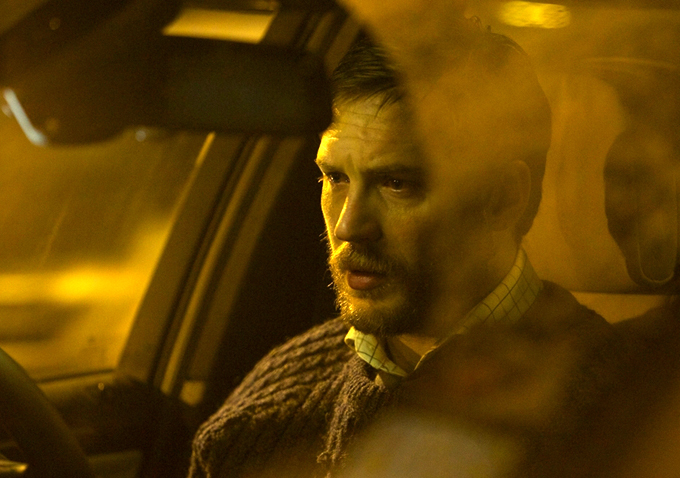And that’s it. Tom Hardy. In a car. Talking to people on the phone. And the fact that Locke is so tense, so compelling to watch, and remains so interesting for an hour and a half speaks volumes to the direction, cinematography, script, and--of course--Hardy’s performance.
Locke plays out more like a play than a traditional plot-driven movie. I could easily see it making the jump to the stage with minimal revisions. (I’m being intentionally obtuse about any plot details because what minimal plot there is should be experienced with as little prior knowledge as possible.) The way the film was made even resembles a stage production: Hardy filmed his part over the course of six days, actually running through the entire film multiple times each day while the other actors, who were all in a hotel room, called him in the car. When each run through was done, they would reset, reposition the cameras, and go again. The continuous shooting schedule comes across in the final product; I really felt like I was watching these events unfold as they happened.
Simply put, Tom Hardy has never been better. His fantastic, understated performance as Ivan Locke is the centerpiece of the film. To say that Hardy is this movie would not be in the slightest bit inaccurate: Locke is the only character we ever see on camera for the duration of the movie, so in the hands of a less than capable actor the entire film would have crumbled. In Hardy’s hands, however, Locke becomes a character study as much as it is taut thriller. The Welshman who always finds a solution, no matter the problem, is calm under pressure and rational by nature, yet cracks begin to show in the veneer by the time the film concludes. Hardy never overacts, never exaggerates Locke’s reactions to the crazy things that begin to unfold. Locke remains a believable and relatable protagonist that stays grounded in what he wants and needs to accomplish. It’s an amazing, nuanced performance, and is one of the best he’s ever given. If the film weren’t so small and hadn’t been released in the spring, I’d easily consider Hardy an early candidate for Best Actor.
The cinematography is simple but beautifully executed. Head-on shots of Hardy are most commonly used, with reflections of passing headlights and streetlamps shooting by on the windshield. As the film progresses, however, these highway scenery shots are used to a slightly disorienting effect. A side shot of Hardy, for example, might have laid on top of it a head-on shot of passing cars, rather than a side shot. A head-on shot might have headlights whizzing by in a direction that makes no sense. This very subtle dissonance begins to remove a sense of place from the film; Locke keeps driving, and time keeps passing, but the endless highways blur together. Does he know where he’s going anymore? Does he care?
Like the best single-location movies (12 Angry Men, Tape) Locke takes as simple a premise as you can take--a man driving in his car--and makes a film that’s far more interesting than it has any right to be. The morality play of Ivan Locke is compelling, understated, and mesmerizing.
Grade: B+

 RSS Feed
RSS Feed
